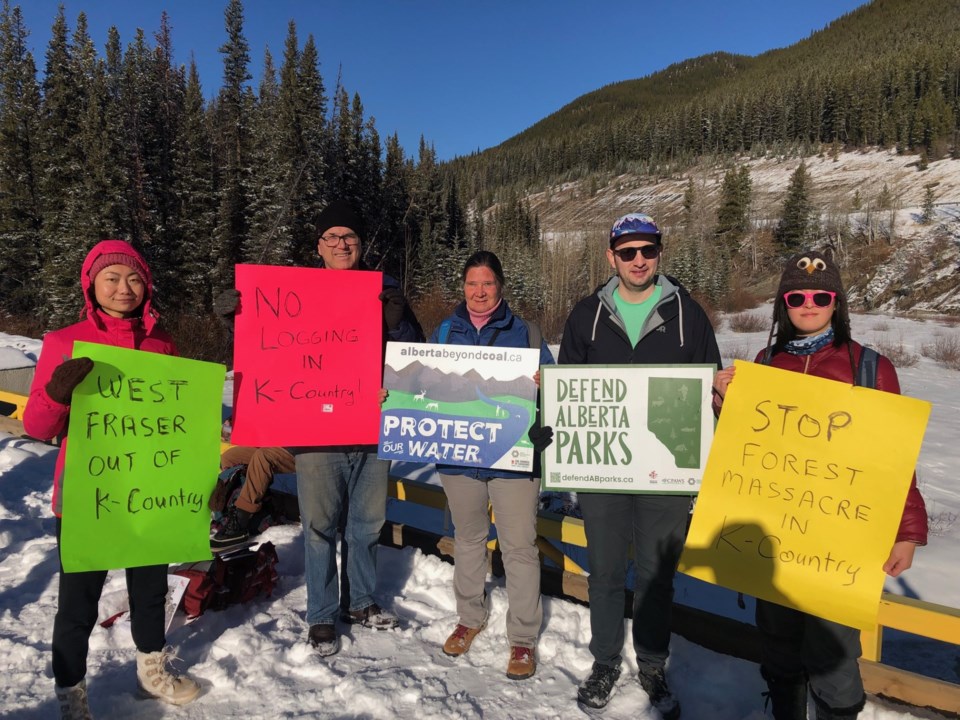A group of protesters gathered at a controversial Spray Lake Sawmills bridge in Kananaskis Saturday to highlight their demand for an immediate pause in plans to clearcut over 2,700 acres in the Upper Highwood drainage.
They say extreme drought and water shortage conditions are expected to continue, necessitating a pause in logging.
Their call represented a new rationale for clearcutting opponents in Alberta and also highlighted the addition of significant new members to the list of those seeking a pause to the impending logging operation, which could start as soon as Dec. 1.
In addition to opponents like environmental and recreational groups and wildlife advocates, Okotoks Mayor Tanya Thorn sent a letter dated Nov. 24 to Minister of Environment and Protected Areas Rebecca Schulz requesting a moratorium on logging in southern Alberta, and High River Mayor Craig Snodgrass has sent a letter to the Calgary Climate Hub supporting their call as well.
Thorn’s letter refers specifically to SLS’s plans to clearcut the Highwood watershed, and Snodgrass’s letter states that SLS does not have a proven track record of regenerating cutovers, and “therefore we do not believe their Forestry Management Plan is sufficient.”
Jenny Yeremiy of Calgary Climate Hub, who organized the demonstration, said the bridge has already gone too far.
She said someone should have stopped SLS before the bridge was built, as it was constructed inside the riverbed, during spawning time.
The forest management license should have been revoked already, she said.
“This is risking the drinking water of 40 per cent of southern Alberta. We are currently looking at 51 regions in southern Alberta that are in Stage Four drought, and we’re looking at stronger drought conditions going forward,” she said.
Yeremiy said they now have 13 groups signed on to a letter to Minister of Forestry and Parks Todd Loewen asking for a larger moratorium on logging in Southern Alberta.
Roger Gagne drove out from Calgary to take part in the protest.
“Healthy forests do three things with water – they slow it down, they spread it out, and they soak it up. When you cut down a forest, you’re disrupting all of those,” he said.
The effects of clearcutting upstream watersheds contributed to how hard High River was hit by the 2013 flood, Gagne said.
“When the heavy rains came and the heavy snowmelt, where was that water going to go? It wasn’t soaking in because those forests had been logged.”
Colin Smith of the Bow Bioregion Regeneration Network said meaningful consultations are needed with impacted communities and stakeholders, including the Ivarhe Nakoda community of Eden Valley, the towns of High River and Okotoks, recreational users and downstream water rights and allocation holders.
“This clearcut exposes Eden Valley to greater flood risk and infringes on their rights and traditional uses of the land,” Smith said.
“The potential impact on drinking water and irrigation is extreme. Under current, severe drought conditions, the impact of the project may be so severe that Alberta might not be able to provide South Saskatchewan River Basin with their agreed-upon interprovincial water allocation responsibilities.”
“Those of us who recognize how special and essential forests are to our well-being need to add our voices to the public discourse to think beyond our forests as timber,” he said.
He said the new owners of SLS, BC’s West Fraser Timber Co. Ltd., has no stake in the health of the Kananaskis ecosystem.
“Their mandate is profit. The goal is to harvest as much timber at the lowest cost possible,” Smith said.
Smith called the plan to clearcut and replace the forest with a tree farm “ecocidal.”
The area is home to threatened species including Westslope Cutthroat trout and Bull trout. Smith said clearcut logging will have serious negative impacts on their habitat.
Devon Earl, a conservation specialist with the AWA told The Eagle in a previous story the Bull trout’s range has already been dramatically reduced due to human activity.
“There’s no room left, really, to compromise on their remaining habitat,” she said.
The Kananaskis Conservation Pass introduced in 2021 now charges Albertans $90 annually to access Kananaskis Country for recreational purposes. The stated purpose of the pass was to ensure investments could be made into protecting and conserving Kananaskis Country.
If – hypothetically – the Forestry department were to step in and put even a temporary halt to SLS’s logging plans, the provincial government could be liable for financial damages to compensate the company for planning and preparation activities, some of which go back years.
Smith said he would be fine with the government using the revenues collected for the park passes to pay for any such damages, since the stated purpose of the fees was to protect the Kananaskis environment.
The Alberta Wilderness Association (AWA) and Take a Stand Kananaskis (TASK) are on record claiming the bridge was built without proper permission from the federal Department of Fisheries (DFO).
In a previous story in The Eagle, SLS said there was no requirement under existing rules for them to get prior permission from the DFO.
DFO launched an investigation into SLS’s activities in the area but has not, as of press time, released the results of that inquiry or even revealed why they opened it.
The Canadian Parks and Wilderness Society (CPAWS) and TASK are also involved in pressuring SLS and the provincial and federal governments to take some action before the trees start falling this winter. All three groups are encouraging Albertans to participate in letter writing campaigns.
As the demonstration took place on a Saturday, no one from SLS or the province was immediately available for response. The Eagle will request their comments Monday and add them to this story as they become available.




